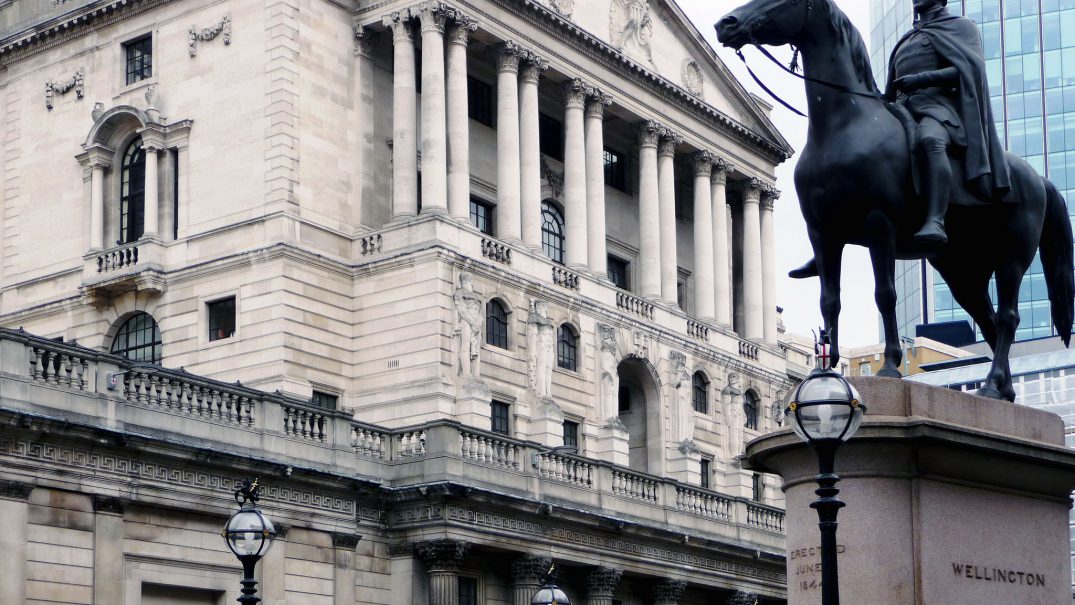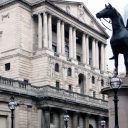An alternative to QE: was Billy Bragg right after all?

The Bank of England. Captain Roger Fenton / Flickr. Public domain.
Last week, much of the economic and business community were left scratching their heads. Billy Bragg – renowned songwriter, musician and campaigner – was delivering his debut lecture at the Bank of England.
The topic of his speech? UK monetary policy, of course.
One of Bragg’s arguments – that quantitative easing (QE) should have been “directed to schools, to hospitals and to a national investment bank” – has been hastily brandished as ‘misguided and dangerous’ by some commentators.
It’s true that Bragg’s case was not articulated in the language of mainstream economics or orthodox policy making. But might his fundamental point have been right nonetheless?
In the latest policy paper for the IPPR Commission on Economic Justice, ‘Just about managing demand’, I argue that it is.
The basic argument goes like this. Since the global financial crisis, policymakers in control of the UK’s two main macroeconomic policy levers have essentially been engaged in a tug of war – pulling simultaneously in opposing directions.
On the one hand, the Bank of England has been testing the limits of monetary policy to get people to increase spending. UK monetary policy has essentially been set to ‘recession mode’ for the best part of a decade – with record low interest rates and vast sums of money pumped into the experimental policy of QE.
On the other hand, governmental fiscal policy has seemingly been set as if to dampen a non-existent economic boom, by deliberately drawing demand out of the economy in the policy generally known as ‘austerity’. In the effort to cut the budget deficit and overall national debt, government spending and borrowing has been cut back by more than 7 per cent of GDP since 2010.
To have the two major macroeconomic policy instruments working in direct opposition to one another for such a prolonged period represents a structural weakness in the way the UK manages its economy.
In fact, there are two structural weaknesses.
First, conventional monetary policy loses its effectiveness when interest rates are very low. Nominal interest rates have an ‘effective lower bound’, a minimum beyond which further reductions have little or no positive effect on spending in the economy – and interest rates in the UK have been at this lower bound for the past eight years.
Second, politicians do not in fact always act as policy makers and academics thought they would. A key assumption underpinning the Bank of England’s independence in 1997 was that governments tend towards overspending – they exhibit what’s known as ‘deficit bias’. But since 2010, governments in the UK have in fact done the opposite, favouring excessive underspending, or ‘surplus bias’.
Neither of these problems would be insuperable on their own. But taken together, they have left macroeconomic policy dangerously ill-equipped to tackle the next recession.
The costs are non-trivial. The government’s Office for Budget Responsibility estimates that the isolated impact of government cuts was to suppress the level of GDP by around 4.5% in 2017/18 alone. That’s more than £1,400 per person.
This is only assumed away if monetary policy is thought to be working properly. But at the lower bound of interest rates we know that it isn’t. Eight years of painfully slow growth – by both international standards and the UK’s own historical record – shows how ineffective policy has been.
Since 2009, the attempted solution to unstick this policy gridlock has been QE. QE represents an attempt to get around the lower bound by creating new money out of nothing, which is then invested in financial markets to reduce interest rates on debt – thereby simulating some of the effect that would have been achieved by an interest cut in the first place.
But as even the chief economist of the Bank of England has conceded, the effects of QE are inherently uncertain and unreliable. QE has also contributed directly to growing wealth inequality, with research at the Bank of England estimating that the isolated effects of the policy have increased stocks of wealth for the richest 10% of households by tens of thousands of pounds compared with the poorest 10%. This has happened with little democratic or public accountability.
As the economist Simon Wren-Lewis has argued, monetary policy makers should regard QE just as the medical profession would regard a new drug where the correct dosage is inherently unknowable, but the side effects are powerful and dangerous. Every possible effort should be made to find a better alternative.
On average, the UK experiences a recession every 10 to 15 years. Now, almost 10 years on from the last crisis – and partly because an effective alternative to QE has not been found – the UK finds itself dangerously unprepared to combat the next downturn.
New fiscal rules, which encourage increased flexibility and investment during recessions, would help. So too would new monetary policy targets. If the Bank of England could be guided by the level of unemployment or nominal GDP as well as the existing inflation target, this would help interest rates rise above the lower bound more sustainably during recoveries.
But neither of these will be sufficient if, when the next recession hits, the UK finds itself with ultra-low interest rates and a surplus biased government, as it does today.
What is needed is a way of getting around the lower bound of interest rates in a way that is both more effective, less regressive (in a redistributive sense) and more democratically accountable than QE – but at the same time shielded from government surplus bias.
Part of the answer borrows from long standing recommendations of other organisations such as the New Economics Foundation. The first step is the creation of a National Investment Bank (NIB), independent of government but mandated to support its industrial strategy and societal ‘missions’. Such a Bank could use a mixture of public and private finance to ‘crowd-in’ further private investment in business growth, innovation, housing and social and physical infrastructure.
But the creation of such a public investment bank would also allow for a further structural innovation in the UK’s macroeconomic framework: the provision for the Bank of England to ‘delegate’ a stimulus to the NIB in the form of increased lending to new and existing projects, when interest rates are at their lower bound.
The Bank of England could calculate the value of a ‘missing’ stimulus, perhaps in terms of the size of an interest rate cut that would otherwise have taken place (such as has been argued by economists such as Tony Yates), and then ask the NIB to deliver all or part of an equivalent stimulus through increased lending.
European law prevents the Bank of England from creating new money to fund a public corporation like the NIB directly, and in any case the NIB would normally be able to fund any delegated stimulus itself by raising capital from private markets (just as similar state investment banks from Germany to Brazil already do today).
But as a backstop to ensure that any required stimulus could always be funded independently from government, the Bank of England could also choose to buy up the NIB’s corporate debts from other financial actors – just as it does through existing QE programmes.
In effect, this would follow a very similar financing mechanism to QE, only the Bank of England would know exactly where the stimulus had gone and how it was benefiting the non-financial economy.
This mechanism would also be preferable to QE on democratic grounds. The Bank of England would be able to determine the size and timing of a stimulus independently from politicians, but the investment targets and public ‘missions’ will have already been specified by elected government.
So was Billy Bragg right after all? Time may still tell. Bragg may not want to change the world, or indeed be looking for a New England – but in his own way, he may yet help the UK prepare itself for the next recession.





